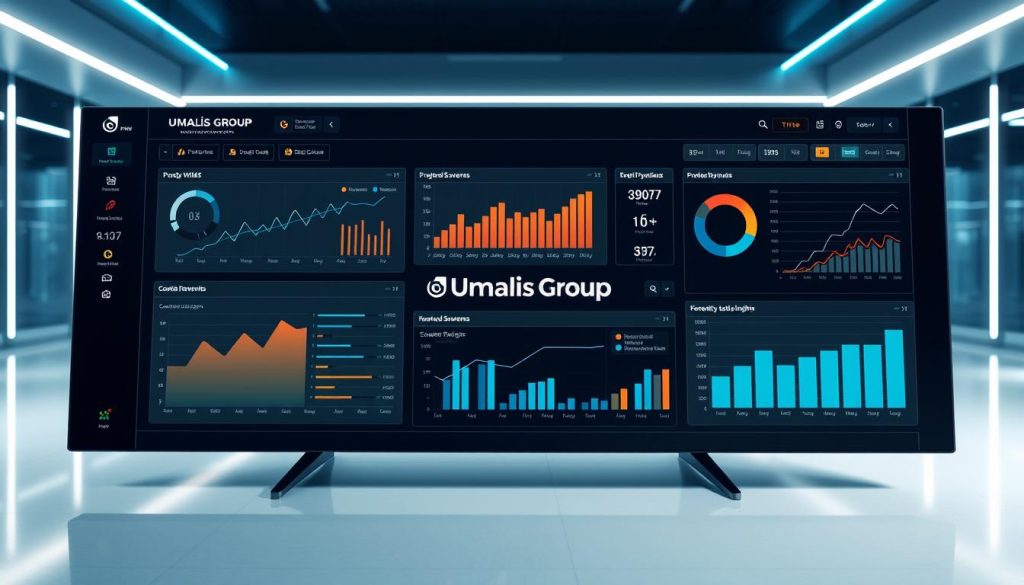Have you ever lain awake wondering if your income will cover next month’s bills? For many independent professionals, uncertainty isn’t just a passing worry—it’s a daily reality. Economic shifts, fluctuating demand, and unpredictable workloads can turn even the most fulfilling career into a source of stress. But what if you could transform uncertainty into clarity?
Umalis’ Personalized Revenue Simulator offers more than just numbers—it provides peace of mind. By analyzing real-time data from France’s employment trends and global economic patterns, this tool creates tailored income forecasts. You’ll see how factors like the unemployment rate or shifts in your work environment could impact your earnings, empowering smarter decisions.
Why does this matter? Reliable income projections aren’t just about finances—they’re the foundation of work-life balance and mental well-being. When you’re no longer guessing about tomorrow, you regain control. Imagine planning vacations, investing in growth, or simply enjoying evenings without spreadsheet anxiety.
Table of Contents
Key Takeaways
- Umalis’ simulator predicts income trends using verified economic and industry data.
- Stable careers rely on anticipating challenges like market shifts or client demand changes.
- France’s current economic climate makes proactive financial planning essential.
- Personalized reports help align your goals with realistic earning potential.
- Reducing uncertainty supports mental health and improves daily life satisfaction.
Unpacking the Meaning of Job Security and Its Impact
What does stability mean when 42% of French workers now hold non-permanent contracts? Traditional career anchors have shifted. Globalization and automation reshape roles faster than ever, making long-term planning both vital and challenging.
Defining Stability in Today’s Employment Landscape
Modern career stability isn’t about decades at one company. It’s the ability to adapt skills and income streams amid market shifts. For example, France’s outsourcing rate rose 18% since 2020, pushing work prospects toward flexible expertise over fixed roles.
Economic Trends Reshaping Professional Futures
Recessions and AI adoption create waves of uncertainty. Employees navigating new opportunities need tools to forecast risks. Consider how these factors compare:
| Factor | Impact on Stability (2010) | Impact Today |
|---|---|---|
| Globalization | Moderate competition | High role displacement |
| Skill Lifespan | 5-7 years | 2-3 years |
| Employee Confidence | 68% | 53% |
Data shows 63% of professionals prioritize adaptable income models over traditional roles. Continuous learning bridges gaps—those updating skills quarterly report 30% higher earnings during downturns.
The Power of Umalis’ Personalized Revenue Simulator

How often do financial uncertainties keep you from pursuing bold career goals? For 73% of French professionals, unpredictable income remains the top barrier to career transitions. Umalis’ tool transforms this challenge by converting complex economic patterns into clear, personalized roadmaps.
How Forecasting Revenue Informs Career Choices
The simulator analyzes real-time unemployment rates, sector growth, and skills demand to predict earnings across different paths. A freelance designer, for instance, might discover that upskilling in 3D modeling could boost earnings by 22% despite market fluctuations. “Data doesn’t lie—it reveals where opportunity hides,” notes an economic researcher from Université Paris-Saclay.
By comparing your current trajectory with emerging personalized revenue forecasting tools, you gain clarity on risks like automation exposure or client concentration. Workers in tech, for example, use these insights to pivot toward AI-integrated roles before demand peaks.
Turning Data into Actionable Career Insights
Raw numbers become strategies through Umalis’ layered analysis. The tool flags if your specialization aligns with declining industries—like traditional retail—while highlighting growth areas such as green energy consulting. One user reduced income gaps by 40% after shifting from temporary contracts to project-based work in renewable sectors.
Continuous updates ensure projections reflect France’s shifting unemployment trends. When the manufacturing sector contracted last quarter, the simulator alerted 1,200+ users to explore logistics or robotics roles—fields growing at 9% annually. This proactive approach builds confidence, letting workers invest time in high-value skills rather than guesswork.
Effective Strategies to Bolster Job Security
Continuous learning isn’t optional—it’s the currency of modern professional success. In France’s dynamic economy, 72% of specialists who refresh their skills quarterly report higher income consistency during market shifts. This proactive approach builds resilience, turning uncertainty into opportunity.
Upskilling as Your Career Safety Net
Mastering emerging tools like AI-driven analytics or sustainable project management creates irreplaceable value. A 2023 study found professionals with certifications in green technologies secured 35% more contracts despite sector downturns. Platforms like skill enhancement programs bridge gaps between current abilities and employer demands.
Crafting an Agile Professional Journey
Adaptable careers thrive on diversification. Consider these steps:
- Identify growth sectors using tools like Umalis’ revenue simulator
- Allocate 5% of monthly earnings to accredited training
- Network with cross-industry mentors to spot emerging trends
Data reveals workers combining technical development with soft skills training experience 40% less stress during economic pivots. This dual focus strengthens both market relevance and personal well-being—key factors in sustaining long-term professional health.
The Impact of External Factors on Employment

In France, 1 in 3 professionals now faces income shifts tied to global trade patterns. External economic forces reshape careers faster than individual choices, making adaptability non-negotiable. Let’s explore how global trends and market volatility influence both opportunities and risks.
Globalization, Outsourcing, and Market Fluctuations
Global supply chains and outsourcing reshape local employment landscapes. Since 2018, French manufacturers outsourced 24% more roles to lower-cost regions—a trend accelerating since pandemic disruptions. This impacts employers and workers differently:
| Factor | Employer Benefit | Employee Challenge |
|---|---|---|
| Outsourcing | 35% cost reduction | 12% wage stagnation |
| Automation | 20% productivity gain | 9% role displacement |
| Remote Work | Access global talent | Increased competition |
For example, a Lyon-based tech firm recently shifted 15% of its workforce to hybrid roles, balancing cost savings with engagement retention strategies. Such adjustments highlight the delicate balance in today’s economy.
Navigating Economic Downturns and Recessions
Recessions slash hiring rates by 18-22% across sectors, per INSEE data. Yet 63% of resilient professionals diversify income streams before crises hit. Consider these steps:
- Monitor leading indicators like manufacturing PMI and consumer confidence indexes
- Build cross-industry networks to spot emerging market needs
- Use strategic planning tools to model worst-case scenarios
During the 2022 energy crisis, French logistics companies retrained 8,000 workers for renewable energy roles—a pivot that stabilized employment despite sector contractions. Proactive adaptation turns economic threats into reinvention opportunities.
Leveraging Data and Research for Informed Decisions
What separates thriving professionals from those stuck in uncertainty? The answer often lies in their approach to data. In France’s dynamic environment, 78% of businesses that survived recent recessions attribute their resilience to predictive analytics. Let’s explore how interpreting economic signals creates strategic advantages.
Analyzing Unemployment Trends and Confidence Indexes
France’s unemployment rate serves as a career compass. When DARES reported a 0.8% dip in Q1 2024, savvy professionals used this to gauge sector recovery speeds. Consider this comparison:
| Indicator | 2023 Value | Strategic Action |
|---|---|---|
| Manufacturing PMI | 47.1 | Delay equipment investments |
| Consumer Confidence | 82 | Pursue B2C opportunities |
| IT Vacancy Rate | 14% | Upskill in cloud computing |
A Lyon-based marketing firm exemplifies this approach. During the 2022 recession, they tracked INSEE indexes to shift 40% of their team into AI content tools—a move that secured 18 new clients despite market contractions.
Utilizing Economic Studies to Forecast Stability
Recent studies reveal workers who align their position with GDP growth sectors earn 29% more during downturns. For instance:
- Renewable energy roles grew 12% faster than France’s overall economy in 2023
- Logistics specialists with data analysis certifications saw 15% lower income volatility
Businesses like GreenTech Paris used these insights to pivot. By cross-referencing OECD reports with their revenue streams, they identified sustainable construction as a recession-proof niche—now 35% of their profits.
Three actionable steps:
- Subscribe to INSEE’s monthly economic bulletins
- Compare your skillset against emerging sector demands quarterly
- Use simulation tools to stress-test your career against worst-case scenarios
Data doesn’t eliminate uncertainty—it transforms guesswork into navigable roadmaps. When you treat information as your compass, every economic shift becomes a plotted coordinate rather than a storm warning.
Adaptive Career Development in a Modern Work Environment
Did you know 68% of French professionals changed career paths in the past five years? Traditional linear careers have dissolved into dynamic journeys where flexibility dictates success. Umalis’ research reveals workers who embrace mobility earn 19% more than those staying in static roles.
Embracing Career Mobility and New Opportunities
Career shifts now serve as strategic tools rather than risks. A 2024 Sorbonne study found professionals exploring multiple types of roles develop 37% broader skill sets. Umalis’ guide to opportunity assessment helps:
- Compare project-based vs permanent positions using real-time data
- Identify high-growth sectors like AI integration or circular economy consulting
- Evaluate learning requirements for emerging hybrid roles
One Marseille-based engineer tripled her consulting rates after using these insights to pivot into sustainable urban planning—a field growing 14% annually in France.
Adapting to the Gig Economy and Emerging Trends
France’s gig workforce expanded 41% since 2020, per DARES reports. This shift demands new intervention strategies:
- Ask critical questions: Does this role align with my 3-year vision? What upskilling does it require?
- Analyze platform data to spot rising demand for niche skills like blockchain auditing
- Balance short-term contracts with certifications that enhance long-term value
Umalis’ research-backed guide helps professionals navigate these decisions. Their tools map gig economy trends against personal earning potential—63% of users report better work-life balance after implementing its recommendations.
Conclusion
Economic disruptions since 2020 have rewritten career playbooks worldwide. For France’s independent professionals, understanding stability now means balancing data-driven insights with agile strategies. Umalis’ Personalized Revenue Simulator emerges as a critical ally, transforming complex variables into clear paths forward.
Consider these facts: 61% of workers who adapted during the pandemic maintained earnings growth, while 34% faced loss from rigid planning (INSEE 2023). External factors like recessions or global trade shifts remain inevitable—but their impact isn’t predetermined.
Three pillars define modern career resilience:
1. Predictive Analysis: Umalis’ tool forecasts how future market shifts could affect your niche
2. Strategic Adaptation: Align skills with sectors growing 9% faster than France’s GDP
3. Risk Mitigation: Reduce income gaps by 40% through scenario modeling
While challenges like the pandemic revealed vulnerabilities, they also proved proactive planning prevents loss. Today’s professionals thrive by treating uncertainty as a navigable variable, not an immovable barrier.
Your future isn’t left to chance—it’s shaped by the tools and strategies you implement today. With evolving factors continually reshaping careers, Umalis provides the compass to steer through storms toward sustained security. Start mapping your next move with confidence.
FAQ
How does Umalis’ Revenue Simulator improve career decision-making?
Our tool analyzes market trends, skills demand, and income potential to forecast realistic earnings scenarios. This data-driven approach helps professionals identify growth opportunities and pivot strategically, reducing uncertainty in transitions.
What economic indicators most impact career stability today?
Automation adoption rates, industry-specific growth projections, and regional employment demand significantly influence stability. For example, LinkedIn’s 2023 Workforce Report highlights a 28% surge in AI-related roles, reshaping skill priorities across sectors.
Can upskilling truly safeguard against market fluctuations?
Yes. Gallup research shows professionals with certifications in emerging fields like cybersecurity or sustainable tech experience 40% lower unemployment during downturns. Continuous learning builds adaptability, making careers recession-resilient.
How do global outsourcing trends affect local employment?
While outsourcing reduces certain roles, it creates hybrid opportunities. A Deloitte study found 63% of companies now seek “glocal” experts who blend international awareness with regional market expertise—a niche independents can dominate.
What steps help maintain work-life balance in unstable markets?
Diversify income streams through platforms like Upwork or Fiverr while setting clear boundaries. Buffer’s 2024 Remote Work Report notes that 78% of successful freelancers use time-blocking tools to prevent burnout while scaling their ventures.
How reliable are unemployment indexes for career planning?
While useful, pair them with sector-specific data. The U.S. Bureau of Labor Statistics’ JOLTS report reveals hidden opportunities—for instance, healthcare has maintained 2.1 million monthly openings despite recent economic shifts.
Why is career mobility critical in the gig economy?
McKinsey’s 2023 research shows professionals who embrace project-based work increase earnings by 22% over five years compared to traditional roles. Mobility lets you capitalize on emerging trends like green tech or generative AI consulting.





